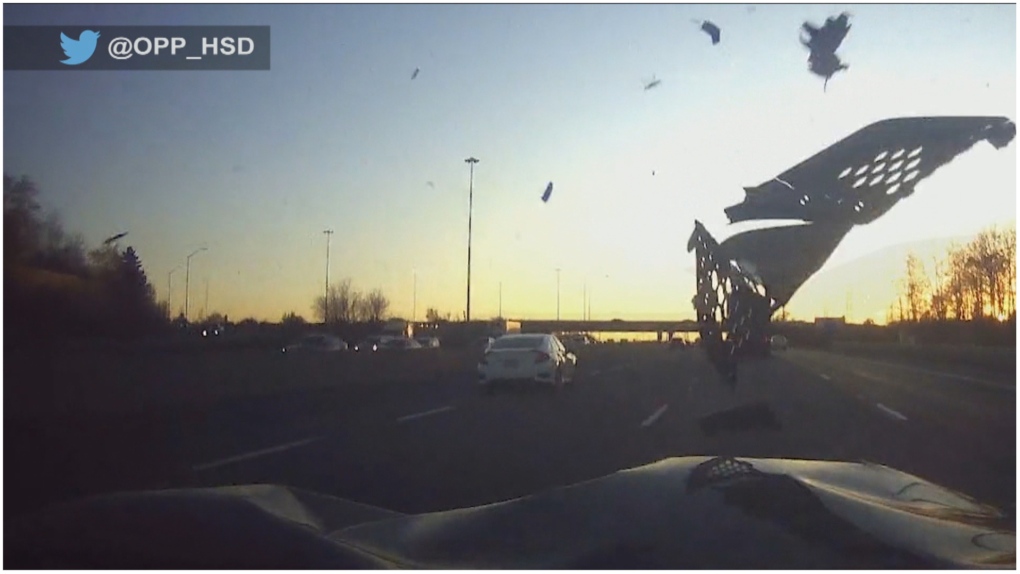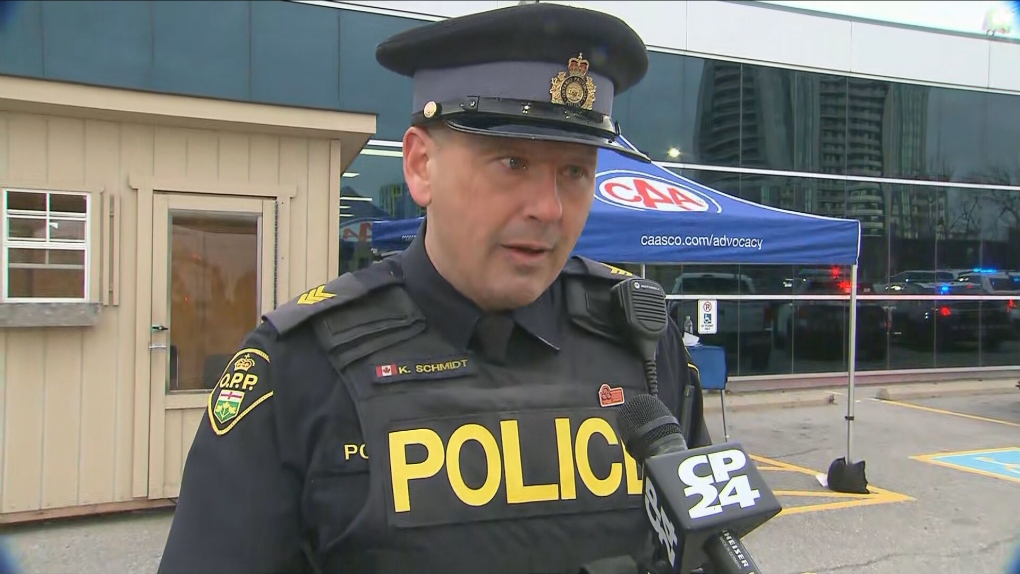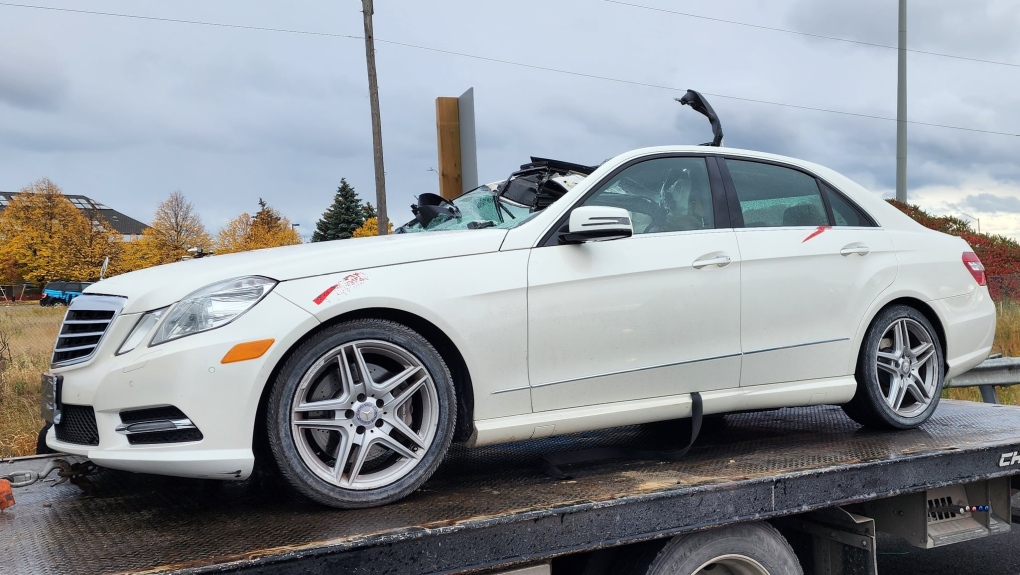Flying wheel crashes into car on busy Ontario highway
New video released by police shows the terrifying moment a wheel went flying into an oncoming car driving on a busy Ontario highway earlier this month.
It happened on Nov. 6 on Highway 403 near Mavis Road in Mississauga, the Ontario Provincial Police told CTV News Toronto.
- Download our app to get local alerts on your device
- Get the latest local updates right to your inbox
In the video posted to Twitter on Tuesday, dashcam video shows a vehicle to the left of the camera abruptly brake and swerve. Then, in the blink of an eye, a car's wheel can be seen bouncing in the direction of the oncoming vehicle before smashing directly into its front end.
The car appears to have sustained serious damage following the collision and someone in the vehicle can be heard reacting to the sudden impact before driving the vehicle off the road.
According to OPP Sgt. Kerry Schmidt, this is just one of a few incidents of detached wheels reported in the area in recent days.
He said, in this case, the driver of the vehicle with the loose wheel was tracked down and charged with improper tire from maintenance issues.
 A detached wheel came crashing into a driver's vehicle as they were travelling on a busy Toronto highway on Nov. 6. (Twitter/ OPP_HSD)
A detached wheel came crashing into a driver's vehicle as they were travelling on a busy Toronto highway on Nov. 6. (Twitter/ OPP_HSD)
“This is the time of year that we get an influx of wheel separations," he told CTV News Toronto in an interview.
The video comes on the heels of CAA South Central Ontario releasing its annual winter driving tips as the colder weather sets in following a warmer-than-usual start to November.
CAA teamed up four other organizations, including the OPP and Ontario’s transportation ministry, to offer up some driving tips to keep you, your passengers, and the other drivers on the road safe this winter.
The first thing you should do, according to the five agencies, is get your winter tires installed.
“It gives you the extra control in those wintry conditions, or even the colder temperatures,” Schmidt said.
 OPP Sgt. Kerry Schmidt speaks with CP24 on Nov. 15, 2022.
OPP Sgt. Kerry Schmidt speaks with CP24 on Nov. 15, 2022.
“Your all seasons will get you going, you can still drive with those, but when you get down at a temperature below seven degrees [Celsius], it’s going to give you that extra bit of traction on those cold roads and those icy, slippery conditions.”
But, as indicated by the video, Schmidt warns these installations need to be done properly because, if not, “they can be deadly.”
He suggests if you’re installing the wheels yourself, you should read the manual, follow the instructions, and go back and check your wheel fasteners to make sure they’re properly torqued after a short distance.
Moreover, if you’ve had your winter tires installed at a body shop, you should be able to have them retightened free of charge if you feel they’ve become loose.
“It happens so fast…The ability for you to react and avoid this collision is almost impossible,” Schmidt said.
Schmidt said there’s already been a few deadly incidents of car tires becoming detached on Ontario highways this season.
In one case, a 77-year-old man was killed after a flying wheel crashed into a vehicle on the Queen Elizabeth Way highway last month.
 A white Mercedes was struck by a flying wheel on Oct. 18, 2022. (OPP)
A white Mercedes was struck by a flying wheel on Oct. 18, 2022. (OPP)
Aside from wheel safety, CAA said drivers need to stay focused on the road, even if it’s driving a routine trip like to and from work, and adjust their speed based on weather conditions.
As well, the agency provided a four-point checklist to ensure you get to your destination safely.
Those include:
KEEP THE GAS TANK ABOVE HALF FULL
According to CAA, cold weather can cause condensation inside your vehicle which can lead to fuel-line freeze-up and can prevent your car from starting.
REMOVE SNOW FROM YOUR CAR BEFORE YOU LEAVE
Any snow left on the roof might slide down onto the windshield and obstruct your vision, CAA said.
MAKE SURE YOUR WIPER FLUID IS FULL
CAA suggests keeping extra fluid in your trunk and making sure it’s rated for negative 40 degress Celsius.
KEEP A STOCKED EMERGENCY KIT
If you get stuck, you’ll want to have plenty of supplies on hand, inluding a flashlight and extra batteries, warning devices (e.g., flares, reflective vests/strips), a first aid kit, blankets, jumper cables, non-perishable food and water plus a phone charger. Be sure to also keep an ice scraper, small shovel and snow brush.
If you do get in a collision or your car breaks down, the OPP recommends moving your vehicle off the road, if you can and it’s safe to do so.
“Never stop on the roadway and if possible, park well off the road and stay inside your vehicle until rescuers arrive,” a news release read.
CTVNews.ca Top Stories

Poilievre's Conservatives end 2024 hitting long-term high in the polls amid Trudeau resignation calls: Nanos
Pierre Poilievre's Conservatives are closing out 2024 hitting a new long-term high in ballot support, with a 26 point advantage over the Liberals amid calls for Prime Minister Justin Trudeau to resign.
WATCH LIVE The world begins welcoming 2025 with light shows, embraces and ice plunges
From Sydney to Vladivostok to Mumbai, communities around the world have begun welcoming 2025 with spectacular light shows, embraces and ice plunges.
Female victim in Calgary double homicide identified as elementary school teacher
Rocky View School Division (RVSD) on Tuesday identified the woman who was murdered Sunday night in Calgary as Ania Kaminski, an elementary school teacher in Cochrane, west of the city.
One arrested following terrifying road rage incident on Hwy. 11 in northern Ont.
Ontario Provincial Police are asking for the public's help in investigating a road rage incident Monday on Highway 11 near Temiskaming Shores.
Telegraph Cove, B.C., fire takes out beloved businesses, parts of boardwalk
The most iconic portion of a picturesque boardwalk in Telegraph Cove, B.C. was destroyed by fire on Tuesday morning.
Woman burned to death inside New York City subway is identified
The woman who died after being set on fire in a New York subway train earlier this month was a 57-year-old from New Jersey, New York City police announced Tuesday.
Xi says no one can stop China's 'reunification' with Taiwan
No one can stop China's "reunification" with Taiwan, Chinese President Xi Jinping said in his New Year's speech on Tuesday, laying down a clear warning to what Beijing regards as pro-independence forces within and outside of the island of 23 million people.
France's Macron acknowledges that dissolving parliament in 2024 backfired but celebrates Olympics
French President Emmanuel Macron acknowledged in his New Year’s address to the nation that his decision to dissolve parliament backfired.
Angelina Jolie and Brad Pitt reach divorce settlement after 8 years
Angelina Jolie and Brad Pitt have reached a divorce settlement, ending one of the longest and most contentious divorces in Hollywood history but not every legal issue between the two.

































